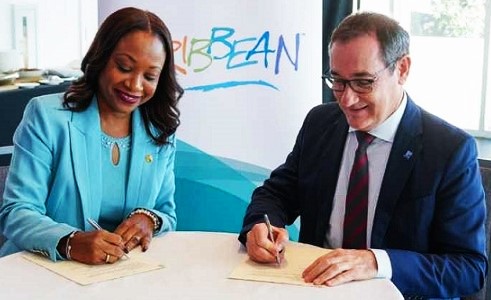Worldwide audience watch Black Sabbath ‘heavy metal bench’ event
Hundreds of thousands of people around the world have watched Black Sabbath’s ‘heavy metal bench’ presentation, organised by Westside Business Improvement District (BID) in Birmingham.
Original band member Tony Iommi accepted the bench from Brummie comedian Jasper Carrott in an exclusive ceremony at St Luke’s Gas Street Church.
Only 350 fans could fit into the building, but hundreds of thousands of people across the world have watched the ceremony after it was expertly edited into one-minute video highlights for social media, as well as being covered by the BBC.
Mike Olley, manager of Westside BID which drove the bench project, said: “We knew there’d be huge interest and so we invited the BBC to the event and our expert media consultant commissioned videographers to create special one-minute video highlights.
When I last checked, these mini videos had been watched by more than 50,000 people via our @WestsideBID Twitter account alone, with tens of thousands more watching it via our Facebook, Instagram and LinkedIn accounts.
The event was featured in prime-time slots by BBC Midlands Today – watched by hundreds of thousands of people across the region, and was also reported on by local print, online and all the mainstream music media in the UK and internationally.
These media hits happened before, during and after the event and successfully brought the world’s attention onto Westside BID and what we’re doing to promote this area and the city.”
The uniquely designed steel bench – incorporating images of the band’s original four members – will eventually be placed on the renamed Black Sabbath Bridge across the canal on Birmingham’s Broad Street.
Speaking at the event, Iommi said: “The bench looks amazing and I think it’s fantastic for Birmingham to recognise us after all the years and all the work we’ve done.
It’s so nice to see all the fans here, and see people come from abroad and all round the world. They’re just brilliant fans.”
Comedian Jasper, who chairs Westside BID’s Walk of Stars project, said: “Throughout the world, Black Sabbath and Birmingham go together and this bench has brought massive publicity for the city.”
Mike Olley added: “It gives Birmingham a new dimension, a little bit like you have in Liverpool for the Beatles. We’ve now got something for Black Sabbath in Birmingham.
And I’ve got no doubt, no doubt whatsoever; people will have day trips up to the city now just to have their photographs taken on the bench, and to celebrate Sabbath. Wonderful, ey?”
Black Sabbath super-fan Mohammed Osama came up with the original ‘heavy metal bench’ idea and this was turned into a project by Westside BID.
Egyptian artist Tarek Abdelkawi created images of Sabbath’s Ozzy Osbourne, Tony Iommi, Geezer Butler and Bill Ward. This was applied in steel by Etch Components from Birmingham’s Jewellery Quarter, with the final manufacture by Gateway Steel Fabricators, based in Tyseley, Birmingham.
Councillor Waseem Zaffar, Cabinet Member for Transport and Environment on Birmingham City Council, helped Westside BID to gain permission to rename the canal bridge on Broad Street as Black Sabbath Bridge, where the bench will eventually reside.










